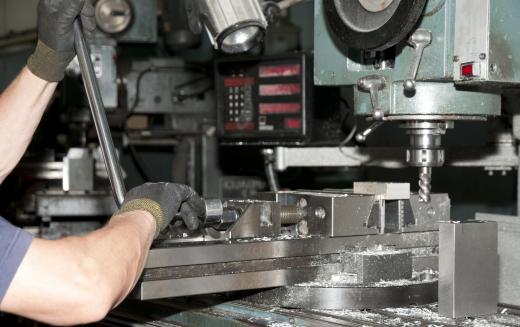A radial drill press is a machine tool that features an extended arm or beam along which a drill head can be moved to conveniently drill holes in large or cumbersome work pieces. A radial drill press allows the operator to advance the drill head along the machine's extended arm, rotate the arm in an arc, or tilt the drill head to drill at an angle. There are a wide range of radial drill press sizes available; big machine shop examples typically featuring large drill size capacities and drill bit cooling systems.
A drill press is a tool that allows for extreme precision in drilling operations. In a typical drill press operation, the drill head moves up and down to drill holes using a rotary handle and a geared bar. This allows the drill head to move vertically while maintaining a perfectly level, upright orientation. The result of this arrangement is added power on the drill stroke because of the mechanical advantage involved and the drilling of perfectly straight holes. The drawback with this system is the small work area which requires constant moving of the work piece if multiple holes require drilling; it also limits the possible size of the work piece.

A radial drill press resolves these challenges by allowing drill head movement in several additional directions while at the same time maintaining vertical alignment. This flexibility is achieved by including an elongated beam or carriage along which the drill head may be moved. This carriage can also rotate in an arc around the drill presses main upright member, thereby allowing for a very large area to be covered. In addition, most radial drill presses allow for the drill head to be tilted and then locked to drill holes in non-vertical orientations. This extended flexibility of motion allows for multiple holes drilled in very large work pieces without the need to constantly move the work pieces.
Heavy, industrial radial drill press machines are typically fitted with chucks capable of accepting very large drill bits with four inch (101.6 mm) capacities being common on larger examples. Provision is also commonly made for drill bit cooling with the fitment of cooling fluid tanks, pumps, and nozzles. Smaller do-it-yourself (DIY) radial drill presses are also available and feature most of the flexibility of their larger, machine shop siblings. These smaller units usually feature table top mounting and standard drill press vice tables.
